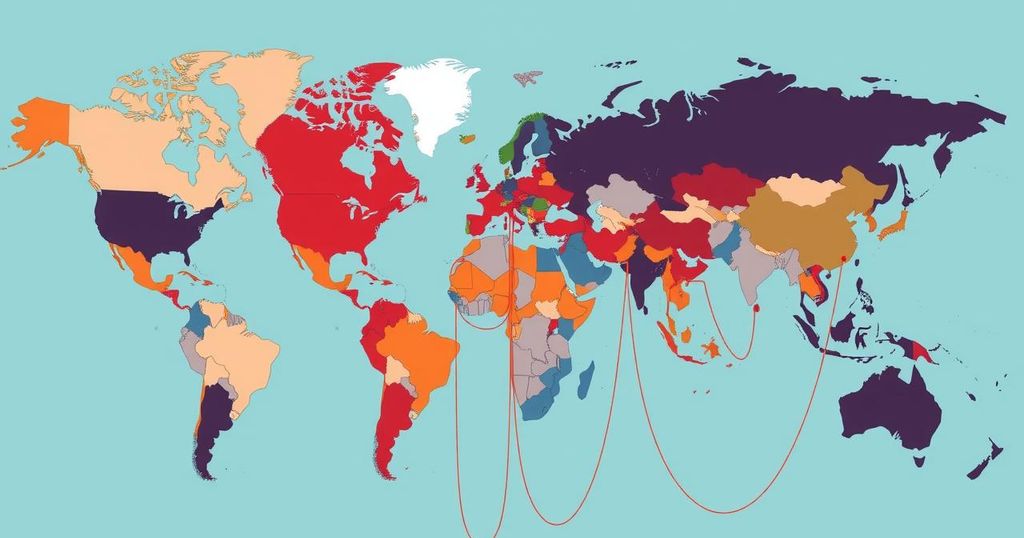Voter Discontent Drives Global Electoral Shifts in 2024

In 2024, global elections across 70 countries saw widespread voter dissatisfaction leading to significant defeats for incumbents. Economic instability and social unrest drove changes in governance, notably in South Africa and India, marking a shift towards populist and far-right movements. With ongoing political challenges, the landscape remains uncertain as demands for reform grow louder from disillusioned electorates.
As the year 2024 unfolded, voters across approximately seventy nations, encompassing half the global population, conveyed a resounding message of discontent to incumbent governments. Upsetting established authorities from India and the United States to Japan, France, and the United Kingdom, voters exhibited a notable inclination to replace longstanding administrations due to economic instability and dissatisfaction with governance. This trend was particularly pronounced with significant losses for the ruling parties in South Africa, India, and several regions in Europe, including the United Kingdom and Austria, indicating a widespread call for change.
The electoral landscape was further complicated by mass protests in countries such as Mozambique and Georgia, political turmoil in South Korea, and the annulment of elections in Romania. Experts, such as Cas Mudde from the University of Georgia, highlighted 2024 as “a great year for the far right, a terrible year for incumbents, and a troublesome year for democracy around the world,” emphasizing the distressing implications for traditional democratic structures.
Political scientists attribute this anti-incumbent sentiment largely to enduring consequences of the pandemic, which they have termed “electoral long COVID.” This phenomenon has left millions dissatisfied, exacerbated by high inflation stemming from global conflicts, notably the Russia-Ukraine war. This environment of rising economic strife and social unrest culminated in significant electoral outcomes, with voters in South Africa decisively shifting away from the African National Congress, their long-standing governance since the end of apartheid.
Elected governments faced a slew of challenges characterized by rising nationalism and right-wing movements across continents. For instance, conservative parties gained momentum in the European Union, diminishing the influence of centrist parties. Notably, Trump’s election in the U.S. has left many uncertain about future foreign relations, compounding instability in regions already facing political dissatisfaction. Across Africa, Asia, and Europe, traditional governing bodies witnessed significant upheavals, with some authoritarian regimes maintaining control amid allegations of electoral fraud and coercion.
As 2024 drew to a close, the situation remained precarious, with several incumbents in precarious positions, facing demands for change amid aspirations for democracy. Surveys indicated a dichotomy between the theoretical support for democracy and the realities experienced by citizens, as Seema Shah from the International Institute for Democracy and Electoral Assistance articulated, stating that while support for democracy exists, satisfaction with democratic processes is alarmingly low. With elections looming in various nations and continued threats to democratic integrity, the coming years will likely witness further turbulence and calls for reform.
The year 2024 was marked by extensive electoral activity, with approximately seventy countries holding elections that resulted in significant changes in governance across multiple regions. This pivotal period highlighted a global disillusionment towards incumbents, driven largely by the effects of the COVID-19 pandemic, rising inflation, and geopolitical conflicts that have led to widespread economic hardship and social unrest. Political analysts have noted a trend towards populist governance and a resurgence of nationalist movements amidst these circumstances.
The political landscape of 2024 reflects a profound shift towards reform as voter dissatisfaction with established authorities culminates in significant electoral changes. The rise of alternative political movements, particularly within the far-right spectrum, poses questions regarding the future stability of democracies around the world. As citizens call for accountability from their leaders, the resilience of democratic institutions will be tested in the face of ongoing global challenges.
Original Source: www.clickondetroit.com






